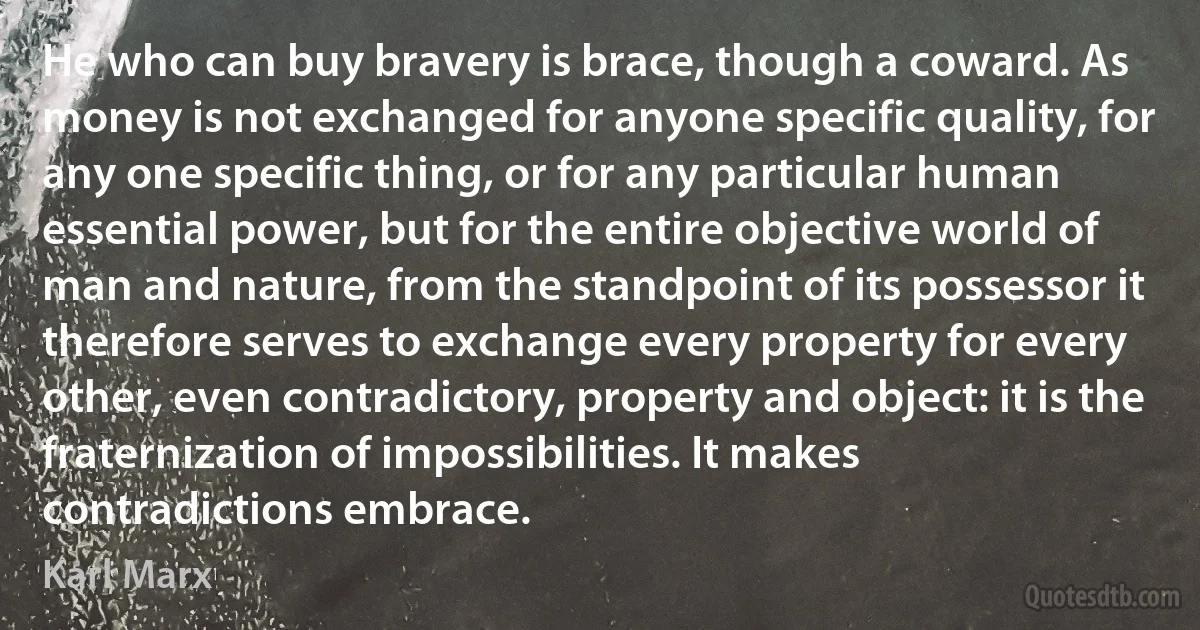Essential Quotes - page 38
This is preeminently the time to speak the truth, the whole truth, frankly and boldly. Nor need we shrink from honestly facing conditions in our country today. This great Nation will endure as it has endured, will revive and will prosper. So, first of all, let me assert my firm belief that the only thing we have to fear is fear itself - nameless, unreasoning, unjustified terror which paralyzes needed efforts to convert retreat into advance. In every dark hour of our national life a leadership of frankness and vigor has met with that understanding and support of the people themselves which is essential to victory.

Franklin D. Roosevelt
The lust for power, which of all human vices was found in its most concentrated form in the Roman people as a whole, first established its victory in a few powerful individuals, and then crushed the rest of an exhausted country beneath the yoke of slavery.For when can that lust for power in arrogant hearts come to rest until, after passing from one office to another, it arrives at sovereignty? Now there would be no occasion for this continuous progress if ambition were not all-powerful; and the essential context for ambition is a people corrupted by greed and sensuality.

Augustine of Hippo
In our time there are many artists who do something because it is new; they see their value and their justification in this newness. They are deceiving themselves; novelty is seldom the essential. This has to do with one thing only; making a subject better from its intrinsic nature.

Henri de Toulouse-Lautrec
One of the most important elements of Christian religion is the idea that justice is an essential quality of God. Since God is the absolute, his justice must be absolute justice, that is to say, eternal and unchangeable. Only a religion whose deity is supposed to be just can play a role in social life. To attribute justice to the deity in order to make religion applicable to human relations implies a certain tendency of rationalizing something which, by its very nature, is irrational-the transcendental being, the religious authority, and its absolute qualities.

Hans Kelsen
It seems to me that today the Surrealist crisis is the central problem in French art. It is essential for future development that this crisis should be solved... The principal error in the aesthetic program of Surrealism is that it is too literary. Painters have experimented with visions, images, dreams, but not with painting, not with color.. .The unpainterliness of Surrealism has inevitably produced a reaction among younger painters. [Jorn is thinking here of French painters such as Bazaine, Esteve, Lapique, Singier, Le Moal, and he suggests there should be reciprocity].. .These artists cannot get any further unless they absorb the lessons of Surrealism into their painting, just as Surrealists can only advance if they adopt the painterly methods of the other group.

Asger Jorn
Not only in the realm of the ethical world, and of economy, but also in that of natural phenomena, the realistic orientation of theoretical research can lead only to "real types" and "empirical laws." And in the above point of view, at any rate, no essential difference between the ethical and the natural sciences exists, but at most only one of degree. The realistic orientation of theoretical research excludes in principle, rather, in all realms of the world of phenomena the possibility of arriving at strict (exact) theoretical knowledge.

Carl Menger
The ideas set forth by organismic biologists during the first half of the twentieth century helped to give birth to a new way of thinking - "systems thinking" - in terms of connectedness, relationships, context. According to the systems view, the essential properties of an organism, or living system, are properties of the whole, which none of the parts have. They arise from the interactions and relationships among the parts. These properties are destroyed when the system is dissected, either physically or theoretically, into isolated elements. Although we can discern individual parts in any system, these parts are not isolated, and the nature of the whole is always different from the mere sum of its parts. The systems view of life is illustrated beautifully and abundantly in the writings of Paul Weiss, who brought systems concepts to the life sciences from his earlier studies of engineering and spent his whole life exploring and advocating a full organismic conception of biology.

Fritjof Capra
The attempt to place the white population under the domination of persons of color in the South has impaired, if not destroyed, the kindly relations that had previously existed between them: and mutual distrust has engendered a feeling of animosity which leading in some instances to collision and bloodshed, has prevented that cooperation between the two races so essential to the success of industrial enterprise in the Southern States.

Andrew Johnson
Since the science of nature is conversant with magnitudes, motion, and time, each of which must necessarily be either infinite or finite...[we] should speculate the infinite, and consider whether it is or not; and if it is what it is. ...[A]ll those who appear to have touched on a philosophy of this kind... consider it as a certain principle of beings. Some, indeed, as the Pythagoreans and Plato, consider it, per se, not as being an accident to any thing else, but as having an essential subsistence... the Pythagoreans... consider the infinite as subsisting in sensibles; for they do not make number to be separate; and they assert that what is beyond the heavens is infinite; but Plato says that beyond the heavens there is not any body, nor ideas, because these are no where: he affirms, however, that the infinite is both in sensibles, and in ideas. ...Plato establishes two infinities, viz. the great and the small.

Aristotle
Kings or parliaments could not give the rights essential to happiness, as you confess those invaded by the Stamp Act to be. We claim them from a higher source-from the King of kings, and Lord of all the earth. They are not annexed to us by parchments and seals. They are created in us by the decrees of Providence which establish the laws of our nature. They are born with us; exist with us; and cannot be taken from us by any human power, without taking our lives.

John Dickinson (delegate)
[One of the company... said: ...is not this the direct contrary of what we admitted before-that out of the greater came the less and out of the less the greater, and that opposites are simply generated from opposites; whereas now this seems to be utterly denied. ] ...then we were speaking of opposites in the concrete, and now of the essential opposite which, as is affirmed, neither in us nor in nature can ever be at variance with itself... these essetial opposites will never, as we maintain, admit of generation into or out of one another.

Socrates
Hereafter follows the "unity without difference,” For the love of God Is not only to be considered as flowing out With all good and drawing in into unity, But it is also above all distinction In essential enjoyment according to The bare essence of the Divinity. And for this reason enlightened people Have found within themselves An essential inward gazing Above reason and without reason, And an enjoyable inclination Surpassing all modes (methods or systems) And all essence, Sinking away from themselves Into a modeless abyss of fathomless beatitude, Where the Trinity of the divine Persons Possess their nature in essential unity.

John Ruysbroeck
Next follows the seventh step, the noblest and most elevated that it is possible to realize in the life of time or eternity. It is attained when, above all knowledge and science, we find within us a limitless ignorance; when, passing beyond every name given to God or creatures we expire and pass to an eternal Unnamable where we are lost; when, further than any practice of Virtue, we contemplate and discover within us everlasting Repose, or immeasurable Beatitude where none can act; when we contemplate above all blessed Spirits an essential Beatitude where all are one, melted, lost, in their Superessence in the bosom of a darkness defying all determination or knowledge.

John Ruysbroeck
In this return in love in the divine ground every divine way and activity and all the attributes of the persons are swallowed up in the rich compass of the essential unity. All the divine means and all conditions, and all living images which are reflected in the mirror of truth, lapse in the onefold and ineffable waylessness beyond reason. Here there is nothing but eternal rest in the fruitive embrace of outpouring love.

John Ruysbroeck



